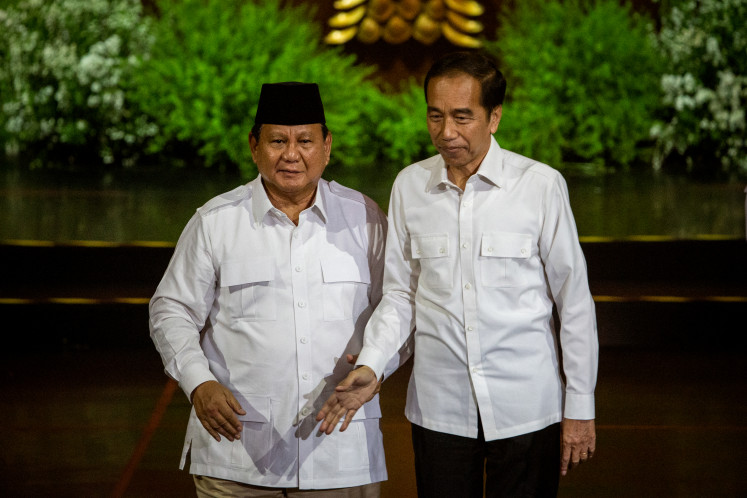Popular Reads
Top Results
Can't find what you're looking for?
View all search resultsPopular Reads
Top Results
Can't find what you're looking for?
View all search resultsCOVID-19: Financial and political grounding for privileged youngsters?
Many young people of even well-off families are deeply anxious upon discovering that their savings are not even enough to cover their expenses for a month, much less a full year, if they get fired from their jobs.
Change text size
Gift Premium Articles
to Anyone
T
he COVID-19 pandemic has impacted everybody hard, especially those working in the informal sector with no social security whatsoever — even millennials of well-to-do families.
According to the Wittgenstein Center for Demography and Global Human Capital, these privileged and highly educated Indonesian youngsters, part of the “demographic bonus” born between the late 1980s and
the 1990s, are few and far between, as just 14.4 percent of Indonesians in this age group have postsecondary education. Those born before 1996 are called millennials and those born afterward are known as Gen Z.
Though relatively few they are a fascinating bunch, coming of age in the Reform Era, amid a zeitgeist of equality and human rights activism. They often blame all society’s ills on those considered capitalists and conservative politicians.
Their idealism has driven them to pursue vocations which they believe can help them fight for the greater good devoid of all the “sins” of big corporations. Many media companies and local NGOs typically pay entry-level workers around Rp 3 million (US$163.72) with meager allowances, compared to entry-level salaries of large corporations, which are over Rp 3.5 million with healthcare perks.
They prefer to work for media companies or NGOs which lack job security, because they believe meaningful work should provide them more than that.
When their parents complain and ask why they do not work for a more profitable multinational company, or advise them to save money instead of splurging on traveling and “empty” intellectual pursuits, their parents are then accused of also being materialistic and conservative.
Yet they would not have been able to enjoy higher education if not for their parents’ privilege and financial security, nor would they have been able to work for NGOs suited to their idealism, if not for their parents’ transfers.
Considering legacies blamed on the New Order regime such as inequality, it is unsurprising that many youngsters have such zeal. (Yet whether harshly calling out enemies like capitalists, conservative politicians or parents counts as social activism is also questionable, to quote former United States president Barack Obama.) Until suddenly they are hit by economic uncertainties under the shadow of the coronavirus outbreak.
The Indonesian Financial Stability Committee’s worst case scenario has it that should the pandemic last to the third and fourth quarters of 2020, economic growth could decline further to a negative 1.03 percent.
The economist Aviliani says the worst-case scenario could leave 3 to 5 million Indonesians unemployed, if not facing pay and allowance cuts, leaving them to live off their savings for at least 12 months until the economy may start rebounding in March 2021.
Many young people of even well-off families are deeply anxious upon discovering that their savings are not even enough to cover their expenses for a month, much less a full year, if they get fired from their jobs.
Thankfully, some have their parents to lean on. Without their parents’ focus in their younger years on finding jobs with financial security, as well as pursuing a progressive career path to ensure bigger savings and pension funds, things that their offspring despise, they might not survive the crisis.
Perhaps this crisis can serve as a grounding for these idealistic and self-righteous youngsters for the first time. Growing up sheltered amid a middle-class boom under the New Order, unlike students in Australia and the US, they had everything covered by their parents.
Though many of their Indonesian counterparts also worked in stores and took other jobs while in college, the fortunate few among Indonesia’s young could relatively take financial security for granted.
Born between the 1950s and 1960s, their parents are indeed conservative when it comes to money, having witnessed their parents raise families in frugal economic times and amid the 1960s political upheaval, before achieving upward mobility. The New Order’s economic progress turned out to be unsustainable amid the 1998 Southeast Asian financial crisis. Yet, by the time the nightmare of layoffs and downsizing hit them, these baby boomers were more or less prepared by living a thrifty lifestyle and avoiding risks, as experience had taught them that security was a temporary illusion.
Maybe now their children realize that their parents’ conservativeness has its merits. They may be less judgmental about their peers who have had to abandon idealistic pursuits to join big corporations. “Why are you joining those people?” a friend said, quoting her friend’s criticism of her move to a multinational firm for its prospects of better financial security.
A colleague in Australia said many idealistic and privileged youngsters there who had previously criticized the conservative administration endlessly, have appeared dumbfounded upon finding how significant government aid has been in helping them survive the pandemic.
No one across the political spectrum really knows exactly how to make the world better. And considering that economic uncertainties and pandemics — driven by the worsening destruction of our wildlife habitat, according to epidemiologist Alanna Shaikh — might be our new normal, know that it is okay that you want to be settled financially.
For the young, this does not mean that you have to abandon your idealistic vocations. However, you are no less valuable a human if you want to be financially established. After all, you can only help others effectively after you have helped yourself.
***
Staff writer at The Jakarta Post










